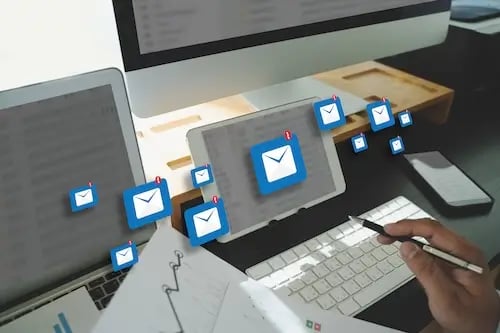The Importance of Email Archiving for eDiscovery
Archiving is critical to accurate email eDiscovery. Organizations must understand the basic principles of email archiving to get the most out of it.
Email archiving is a compliance issue in many industries, especially those with rigorous regulatory standards like ...
Email archiving is a compliance issue in many industries, especially those with rigorous regulatory standards like finance and healthcare. While keeping track of emails sounds simple enough, the commonality of the message delivery format has grown exponentially in recent decades. It is nothing for companies to send and receive thousands of emails daily, depending on the size of the organization and the number of employees.

Traditional email archiving software, those programs that appeared in the mid-1990s and early 2000s, were feasible solutions at the time, but are they still worthwhile and dependable? Are there other archiving solutions that work better that are more efficient, secure, and customizable?
Regulatory bodies have strict demands for document and communication retention. Discover if traditional email archiving methods still stand up to the threats and demands of modern society and compliance standards.
Email archive software is a centralized, secure repository for your organization’s emails, including all incoming, outgoing, and internal emails. The software removes email from individual mailboxes, transitioning them into a long-term archive or storage.
The idea of archiving all corporate emails became essential in the early 2000s with the adoption of several key laws, such as the Sarbanes-Oxley Act (SOX) of 2002 and the Federal Rules of Civil Procedure (FRCP) of 2006— other regulations followed from regulatory bodies like the Financial Industry Regulatory Authority and the Securities and Exchange Commission.
Creating a copy of emails ‘early on’ in their lifetime also meant that end-users didn’t always have to keep them in their mailbox. This helped for the early days of on-premise email when storage was relatively expensive.
Regardless of what drove the popularity of the software, it had its benefits:
Also, because the software compiled/stored data elsewhere, it reduced the strain on email servers, improving responsiveness and speed.
While email archiving software was crucial in the early 2000s, it is now impractical to save every email in an organization unless you implement email journaling, and, despite assumptions, it is not required by rules and regulations in all industries. The average business professional or employee can receive over 126 emails daily. These messages can include crucial data, but most are quick exchanges between colleagues that have little, if anything, to do with regulatory compliance.
Compliant email archive software that compiles or collects every email is likely a requirement in most global businesses, especially those with the strictest regulations like financial and healthcare practices. With the tsunami of emails that bombard a business daily, it is better to focus on an archiving technique that compiles or collects emails based on relevance and importance to compliance, daily operations, legal situations, and historical preservation.
What’s the best way to do that? Let’s take a look….
The best modern email archive migration software is email journaling. It uses software or programs to automatically and immediately capture copies of all incoming and outgoing organization emails. The program uses an immediate capture technique to collect emails as soon as they enter or leave a company’s environment. It collects the emails even before they reach the intended recipient.
They typically take a copy of every email.
The primary benefit of email journaling as an alternative to email archiving software is its use of rule configuration. Administrators can set up rules to instruct the program on which emails to collect. The rules can include sender or receiver IDs, keywords, and other pertinent details.
Like traditional archiving software, email journaling uses secure, centralized storage, but it also uses immutable storage, preventing users from modifying or deleting emails in the archive, ensuring an accurate and reliable record. Administrators can also place legal holds on specific emails, which prevents them from being deleted as part of routine data cleanup processes.

Email archiving software and email journaling both support data management; however, email journaling is more efficient (as it doesn’t rely on an end-user or some overnight process), customizable, and tamper-proof. While traditional archiving software uses a separate server for archived emails, it does not achieve the level of security of the dedicated journal archive or separate archiving system for email journaling.
The fundamental problem with traditional archiving software is accessibility. Because of the lax user controls, and the delay in when the archive copy is made, traditional programs offer opportunities for email modifications or deletions. An email journaling approach locks emails away behind secure system barriers, preventing alteration and accidental or intentional deletion.
Ultimately, traditional archiving software prioritizes long-term storage, email server space, and compliance in a broader sense. With the advent of cloud based email solutions the ‘saving space’ analogy isn’t really a compelling factor for most organizations. Journaling prioritizes safeguarding information, creating an unchangeable record of email communication for strict compliance and legal situations.
There isn’t a single “best” method for long-term email storage. Traditional email archiving software and modern email journaling are both capable solutions. That said, the preferential method depends on regulatory requirements, eDiscovery needs, and data importance and sensitivity.
If a company operates in a highly regulated industry, like finance or healthcare, email journaling is the best and sometimes mandated option. For less stringent industries, traditional archiving might be sufficient for legal retention periods or essential record keeping.
But many global businesses face different legal situations in different countries, and these legal methods are changing frequently. This leads many large organizations to require an email journaling solution.
Legal investigations and audits are often time-sensitive matters, requiring quick searches of email archives. Email journaling might create an organized and searchable database or index of email exchanges for rapid collection of pertinent information. Traditional indexing of email arching may suit occasional and less-timely eDiscovery requests.
Finally, regarding the importance of data and security, email journaling is the best method currently available. The technique provides tamper-proof, unalterable records, ensuring strict compliance with even the harshest regulations. A standard archiving software with strong access controls does not come close to the security and protections offered through a journaling program.
Some companies may benefit from a hybrid approach to email conservation. They may prefer to use journaling for specific senders and recipients, capturing all emails from departments that deal with sensitive data and requiring targeted email rules. The organization can then use standard archiving software for all other correspondence, ensuring long-term records.
At Cloudficient, we introduced Expireon to help with the burden of needing an untouched copy of all email, while maintaining the data in an accessible format for when data needs to be extracted. Expireon also facilitates high level eDiscovery and quickly get important data to other external legal systems for your legal team to perform more analysis on.

Traditional email archiving software is not worth the investment, especially in highly regulated industries. Conventional archiving software processes can cause lost data and incomplete records. Also, the programs are inadequate for real-time supervision, only collecting data “after the fact.” The software is also slow and cumbersome in eDiscovery processes, often taking several days to compile necessary documents or data.
While traditional archiving software is not worth it, archiving with email journaling still is. Cloudficient offers email journaling archiving solutions, Expireon, which stands up to the most rigorous compliance standards, including FINRA and HIPAA. It even has data migration or onboarding built-in via the ReMad platform. Also, Cloudficient offers customizable solutions tailored to your organization’s specific needs and technical requirements.
Cloudficient, with its team of experts and state-of-the-art platform, analyzes your current email systems, data volumes, and compliance requirements to suggest optimal archiving solutions for your business. The platform integrates seamlessly with Microsoft 365 and can orchestrate secure data migration.
Cloudficient prioritizes data integrity with secure storage and tamper-proof archiving, guaranteeing email record authenticity. Also, the system is scalable, adjusting and evolving with your organization’s compliance and record-keeping needs.
While conventional email archiving software is essentially obsolete, modern email journaling remains paramount to compliance and historical tracking demands. Cloudficient is a data migration and archiving platform capable of handling your email archiving needs. If you want to learn more about Cloudficient as an email archiving solution, visit our website or contact us.
With unmatched next generation migration technology, Cloudficient is revolutionizing the way businesses retire legacy systems and transform their organization into the cloud. Our business constantly remains focused on client needs and creating product offerings that match them. We provide affordable services that are scalable, fast and seamless.
If you would like to learn more about how to bring Cloudficiency to your migration project, visit our website, or contact us.
Archiving is critical to accurate email eDiscovery. Organizations must understand the basic principles of email archiving to get the most out of it.
Learn the importance of email archiving compliance & litigation readiness. Read about legal requirements & the risks of not having an email archiving...
See how email archiving can save space & provide other benefits. Discover the advantages of archiving emails & implementing an email archiving...